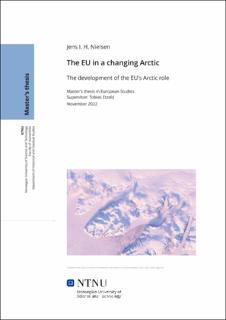| dc.contributor.advisor | Etzold, Tobias | |
| dc.contributor.author | Nielsen, Jens Isak Hultgren | |
| dc.date.accessioned | 2023-01-31T18:20:39Z | |
| dc.date.available | 2023-01-31T18:20:39Z | |
| dc.date.issued | 2022 | |
| dc.identifier | no.ntnu:inspera:127448144:64363050 | |
| dc.identifier.uri | https://hdl.handle.net/11250/3047584 | |
| dc.description.abstract | Denne avhandlingen en longitudinell casestudie, som har som mål å undersøke og forklare utviklingen og endringen av EU som aktør i Arktis siden nordområdene gjorde inntreden på den globale og europeiske politiske agendaen i årene 2007/2008. For å forklare utviklingsen til EUs rolle i regionen, tar denne studien i bruk den prosessorienterte aktørtilnærmingen utviklet av Bretherton og Vogler – og undersøker EUs engasjement i langs dimensjonene mulighet, tilstedeværelse og kapasitet. Dermed blir EUs utvikling som en arktisk aktør undersøkt og forklart i lys av: 1) den politiske mulighetsstrukturen den har måttet navigere i søken etter sin arktiske rolle, 2) de mange dimensjonene ved dens omfattende og utviklede regionale tilstedeværelse, og 3) EUs kapasitet i politikkutforming til å kapitalisere på muligheter og tilstedeværelse, og utforme konkrete målsetninger og narrativer for sitt engasjement. EUs arktiske politikkutforming vurderes utifra en sekvensiell analyse av de fire versjonene av EUs Arktispolitikk – fra 2008, 2012, 2016 og 2021.
Funnene i studien viser at EUs utvikling som en arktisk aktør har vært langsom, inkrementell og ikke-lineær – muliggjort av en omfattende regional tilstedeværelse som en kilde til strukturell makt, men betydelig begrenset av mulighetsstrukturene i det arktiske regionale systemet. Gjennom et komplekst samspill mellom EUs politikkutforming og den arktiske mulighetsstrukturen har utviklingsbanen til EU som en arktisk aktør vist både positive og negative utviklingstrekk når det gjelder omfang, dybde, ambisjoner og narrativ. Studien konkluderer at EU så langt har utviklet en arktisk rolle som er relativt fragmentert, og dens 'aktørskap' har i stor grad blitt utøvd innenfor funksjonelle og saksspesifikke nisjer. Samtidig gjør potensielle endringer i den arktiske mulighetsstrukturen i kjølvannet av Russlands invasjon av Ukraina, samt en synlig ny tilnærming i EUs politikkutforming overfor Arktis siden 2021, at viktige endringer kan være i emning. | |
| dc.description.abstract | This thesis is a longitudinal case study with the aim of investigating and explaining the development and change of the EU as an actor in the Arctic since the region fully emerged on the global and European political agenda in 2007/2008. In seeking to explain the developmental path of the EU’s role in the region, this study adopts the process-oriented actorness approach developed by Bretherton and Vogler – examining the EU’s engagement with the Arctic region along the dimensions of opportunity, presence and capability. Thus, the EU’s development as an Arctic actor is examined and explained in relation to the political opportunity structure it has had to navigate in pursuit of its Arctic role, the multiple dimensions of its extensive and developed regional presence, and the ability of the EU’s own policymaking to capitalize on this presence and develop coherent and concrete narratives and objectives for its engagement. The EU’s policymaking towards the Arctic is analysed sequentially through the four iterations of the EU’s Arctic policy – adopted in 2008, 2012, 2016 and 2021.
The findings of the study show that the EU’s development as an Arctic actor has been slow, incremental and non-linear – enabled by an extensive regional presence as a source of structural power, but significantly constrained by the opportunity structure of the Arctic regional system. Through a complex interaction between EU policymaking and the Arctic opportunity structure – encompassing pushback, adaptation, consolidation and reaction – the developmental trajectory of the EU as an Arctic actor has shifted between positive and negative developments in terms of scope, depth, ambition and narrative. The study concludes that the EU to this point has developed an Arctic role that is relatively fragmented, its actorness being exercised within a series of functional and issue-specific niches informed by presence and opportunity. However, significant and still-developing events within the Arctic opportunity structure following Russia’s invasion of Ukraine, as well as new approaches in EU policymaking towards the Arctic seen in the 2021 EU Arctic policy means that this situation may be set to change.
Keywords: European Union, Arctic policy, Arctic governance, actorness, presence. | |
| dc.language | eng | |
| dc.publisher | NTNU | |
| dc.title | The EU in a Changing Arctic - The development of the EU's Arctic role | |
| dc.type | Master thesis | |
